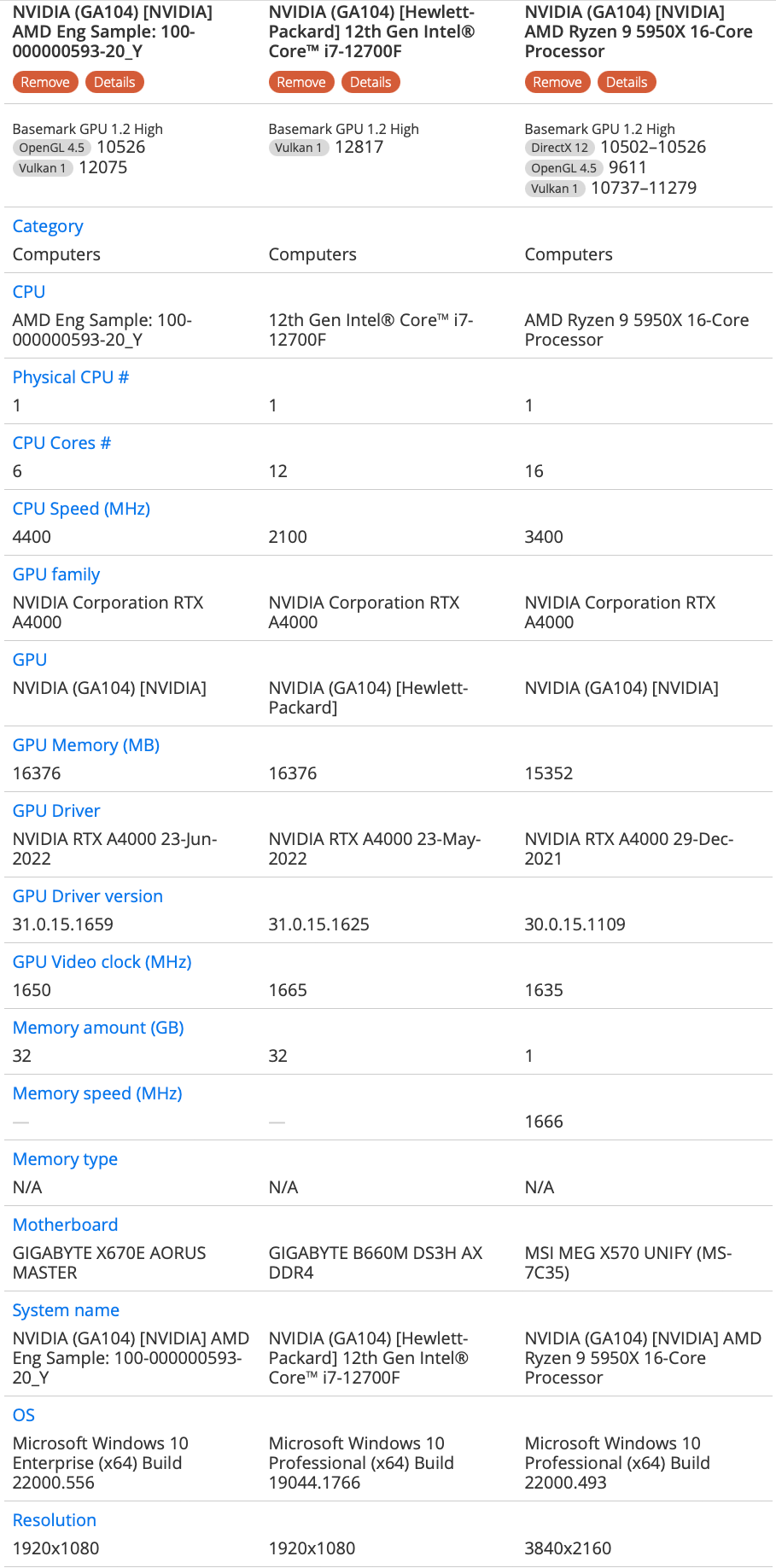Alleged AMD Zen 4 Ryzen 7000 Benchmarks Emerge
AMD's Raphael benchmarked with an Nvidia RTX A4000 graphics board.
AMD's preparations for its Ryzen 7000 'Raphael' launch are on the home stretch. Many partners are testing AMD's latest processors, so it is not surprising that some test results "accidentally" leak. This time around someone has allegedly tested a rather unexpected combination of components: a six-core Ryzen 7000 'Raphael' CPU and Nvidia's workstation-grade RTX A4000 graphics card.
The system found by @Tum_Apisak in the Basemark database is powered by a six-core AMD Eng Sample: 100-000000593-20_Y processor clocked at 4.40 GHz that is installed into Gigabyte's X670E Aorus Master motherboard. The machine scored 12075 points on Vulkan 1 test and 10526 points in OpenGL 4.5 test, which are rather good results. As this is a leak, take the news with a pinch of salt until it can be verfified.

The six-core configuration of AMD's Ryzen 7000-series CPU indicates that we are potentially talking about a mainstream part. Meanwhile, a very high base frequency promises to make this mainstream processor a very capable performer. To put the number into context, AMD's current six-core CPUs, for example the Ryzen 5 5600X, top at 3.70 GHz base clock and 4.60 GHz boost clock.
Still, we do not know whether the chip was a prototype of a real product, or just an engineering sample clocked at 4.40 GHz (after all, we are dealing with a system based on a motherboard designed for CPU overclocking), so take the frequency with a grain of salt.
Basemark is meant to test systems and devices, but it still is primarily a graphics benchmark, so actual test results of the system featuring AMD's six-core Ryzen 7000 'Raphael' CPU and Nvidia's RTX A4000 graphics board depend on performance of the latter. Nonetheless, CPU's ability to feed the data to the GPU also impacts final results and we have to say that the machine performs rather well when compared to other PCs with an RTX A4000 card.

In Vulkan 1 tests the new machine performed slightly worse (-5.8%) than Intel's mighty Core i7-12700F (8 P-cores, 4 E-cores) in a 1920x1080 resolution. Furthermore, it outperformed a system running AMD's 16-core Ryzen 9 5950X (one of the best gaming CPUs around) both in OpenGL 4.5 and in Vulkan 1, but the PC featuring the Ryzen 9 5950X ran the benchmark in a 3840x2160 resolution and used drivers from December 2021, so this is not exactly a fair comparison.
In general, AMD's Ryzen 7000-series 'Raphael' processors look quite promising, especially if AMD can clock production six-core CPUs at 4.40 GHz. But let's wait for Zen 4-based production units and appropriate review at Tom's Hardware to verify our feelings. In the meantime, you can learn everything we know by heading to our AMD Zen 4 Ryzen 7000 Specs, Release Date Window, Benchmarks, and More article.
Stay On the Cutting Edge: Get the Tom's Hardware Newsletter
Get Tom's Hardware's best news and in-depth reviews, straight to your inbox.

Anton Shilov is a contributing writer at Tom’s Hardware. Over the past couple of decades, he has covered everything from CPUs and GPUs to supercomputers and from modern process technologies and latest fab tools to high-tech industry trends.
-
-Fran- I'm scratching my head a bit with this one... Bigger numbers always better (hurr durr), but how does this test escales across cores? Does it like memory bandwidth? Low latency? CPU cache? Only computing/prowess? Anyone that can read between the lines a bit better for this test? Also: anything other to compare that's closer? Like a 5600(X) or an i5 11600K/12400/12600K? for a more apples to apples comparison?Reply
In any case, good I guess? XD
Regards. -
thisisaname Yet another "leak" wait a bit and someone else will "leak" some more. Wake me up when someone releases some solid information.Reply -
Wolverine2349 I ran the test myself and it did not peg more than 2 cores close to full usage. It only appeared to peg 2 cores like 80 percent usage and 1 core like 50% on 1 5900X. And I got an insane score and 600-1000 of FPS with an RTX 3090 Ti.Reply
Is the RTX 3090 Ti that much more powerful than the A4000?
So yeah its not an apples to apples comparison. If this test loaded well above 6 CPU cores, I would be excited that a 6 core Zen 4 would beat a 16 core Zen 3 by 11% as imagine how much better with more cores.
But no this is very thread limited even much more so than games.
So results especially if the clocks were boosted higher on engineering sample are very disappointing for Zen 4 uplift over Zen 3. If it was at stock base 4.4GHz and the others boosted to their 1 core max frequency, results are pretty good.
But either way too early to tell.
Though I hope Zen 4 can have at least Golden Cove IPC and 5GHz or higher all core clocks. That is what I can turn to get 12 strong cores of same arch since Intel is not offering anymore than 8 strong cores, rather just adding more atom e-core clusters to their next gens sadly.
I am not sure how much Cinebench should be taken into account single core performance for Ryzen 7950X:
https://www.cpu-monkey.com/en/cpu-amd_ryzen_9_7950x
It says it has a boost clock of 5.5GHz. If a Zen 5 core really needed 5.5GHz to be 8 points less than a 12900K Golden Cove core, that would not be good. Though I am not sure if it really boosted to 5.5GHz or if the pre-sample just ran at base 4.5GHz in which the Cinebench score being 1989 in contrast to 12900K 1997 would be good. I believe the 12900K boosts to 5.2GHz single core per Intel website. If Zen 4 at 4.5 can almost match it great. If it needs 5.5GHz to almost match or barely beat 5GHz boost 12700KF, not good at all.
We shall see soon.